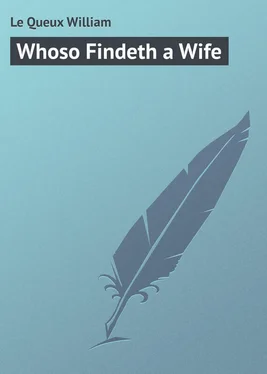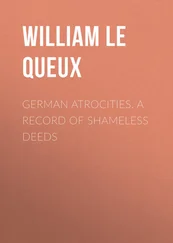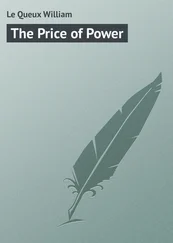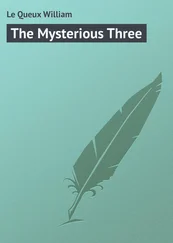William Le Queux - Whoso Findeth a Wife
Здесь есть возможность читать онлайн «William Le Queux - Whoso Findeth a Wife» — ознакомительный отрывок электронной книги совершенно бесплатно, а после прочтения отрывка купить полную версию. В некоторых случаях можно слушать аудио, скачать через торрент в формате fb2 и присутствует краткое содержание. Жанр: foreign_prose, на английском языке. Описание произведения, (предисловие) а так же отзывы посетителей доступны на портале библиотеки ЛибКат.
- Название:Whoso Findeth a Wife
- Автор:
- Жанр:
- Год:неизвестен
- ISBN:нет данных
- Рейтинг книги:4 / 5. Голосов: 1
-
Избранное:Добавить в избранное
- Отзывы:
-
Ваша оценка:
- 80
- 1
- 2
- 3
- 4
- 5
Whoso Findeth a Wife: краткое содержание, описание и аннотация
Предлагаем к чтению аннотацию, описание, краткое содержание или предисловие (зависит от того, что написал сам автор книги «Whoso Findeth a Wife»). Если вы не нашли необходимую информацию о книге — напишите в комментариях, мы постараемся отыскать её.
Whoso Findeth a Wife — читать онлайн ознакомительный отрывок
Ниже представлен текст книги, разбитый по страницам. Система сохранения места последней прочитанной страницы, позволяет с удобством читать онлайн бесплатно книгу «Whoso Findeth a Wife», без необходимости каждый раз заново искать на чём Вы остановились. Поставьте закладку, и сможете в любой момент перейти на страницу, на которой закончили чтение.
Интервал:
Закладка:
“How long have you known the deceased?” the Coroner inquired, looking up suddenly from his notes.
“A few months. About six, I should think,” he answered.
“Have you any suspicion that he had an enemy?”
“No. He was about the last man in the world who would arouse the hatred of anybody. In fact, he was exceedingly popular.”
“You say you have been a frequent visitor at Mrs Laing’s. Now, from your own observations, have you seen anything that would lead you to the belief that he loved Miss Laing?”
“Nothing whatever,” he replied. “Ella was engaged to Mr Deedes, and although she was on the river a great deal with Ogle, I am confident she never for a moment regarded him as her lover.”
“Why are you so confident?”
“Because of certain facts she has confided in me.”
“What are they?”
He was silent. Evidently he had no intention of being led on in this manner, but, even finding himself cornered, his imperturbable coolness never deserted him, for he calmly replied, with a faint smile, —
“I refuse to answer.”
“Kindly reply to my question, sir, and do not waste the time of the Court,” exclaimed the Coroner, with impatience. “What were these facts?”
Again he was silent, twisting his gloves around his fingers uneasily.
“Come, answer if you please.”
“Well,” he replied, after considerable hesitation, “briefly, she gave me to understand that she loved Deedes, and had refused to listen to the deceased’s declaration of affection.”
“How came she to confide this secret of hers to you?” the Coroner asked eagerly.
Through my memory at that moment there flashed the scene I had witnessed in secret in the garden on that memorable night when I had detected this man with his arm around Ella’s waist, and I looked on in triumph at his embarrassment.
“I am a friend of the family,” he answered, with a calm, irritating smile a moment later. “She has told me many of her secrets.”
I knew from the expression upon his face that he lied. Was it not far more likely that on that night when I had discovered them he was uttering words of affection to her, and she, in return, had confessed that she loved me?
“Are you aware whether Mr Deedes had any knowledge that the deceased was his rival for Miss Laing’s hand?” inquired the Coroner, adding, self-apologetically, “I much regret being compelled to ask these questions, for I am aware how painful it must be to the family.”
“I believe he was utterly ignorant of it,” Beck replied. “He regarded Mr Ogle as his closest friend.”
“A false one, to say the least,” Dr Diplock observed in tones just audible. Beck shrugged his shoulders, but did not reply.
The inquisitive foreman of the jury then commenced a series of clumsy, impertinent questions, many of which the witness cleverly evaded. He resented this man’s cross-examination just as I had done, and during the quarter of an hour’s fencing with the tradesman no noteworthy fact was elicited. The Coroner, seeing this, suddenly put an end to the foreman’s pertinacious efforts to draw from the Member of Parliament further facts regarding home life at “The Nook,” and called Dr Allenby.
The doctor, who had apparently had long experience of inquests, took the oath in a business-like manner, and related the facts within his knowledge clearly and succinctly, describing how I had summoned him, his visit to “The Nook,” and the appearance of the dead man.
“Have you made a post-mortem ?” the Coroner asked, without looking up from the notes he was making.
“I made an examination yesterday, in conjunction with Dr Engall. We found no trace of disease, with the exception of a slight lung trouble of recent date.”
“Was it sufficient to cause death?”
“Certainly not; neither was the bruise upon the forehead, which had, no doubt, been caused by the fall upon the gravel. The heart was perfectly normal, and we failed utterly to detect anything that would result fatally. The contents of the stomach have been analysed by Dr Adams, of the Home Office, at the instigation of the police, I believe.”
“Then, as far as you are concerned, you are unable to determine the cause of death?”
“Quite. It is a mystery.”
The next witness was a thin, white-haired, dapper little man, who, in reply to questions, explained that he was analyst to the Home Office, and had, at the request of the police, submitted the contents of the deceased’s stomach to analysis, the position of the hands pointing to a slight suspicion of poison.
“And what have you discovered?” inquired the Coroner, the Court being so silent that the proverbial pin, if it had been dropped at that moment, might have been heard.
“Nothing,” he answered clearly. “There was no sign of anything of a deleterious nature whatsoever. The deceased was certainly not poisoned.”
The assembly of excited townspeople again shifted uneasily, as it was wont to do after every important reply which might elucidate the mystery. It seemed as though a rumour had been circulated that Dudley had been poisoned, and this declaration of the renowned analyst set at rest for ever that wild, unfounded report. People turned to one another, whispering excitedly, and a shadow of disappointment rested upon their inquisitive countenances. They had expected it to be pronounced a case of murder, whereas it would now be proved that death had occurred from some natural but sudden and unknown cause.
“Then you have no opinion to offer as to the cause of death!” the Coroner exclaimed.
“None whatever,” was the reply, and that concluded the analyst’s important testimony.
The foreman of the jury expressed a wish to put a question to Ella, and a few moments later she stood where I had stood, and removing her glove, took the oath with trembling voice.
“Have you any reason to suppose, Miss Laing, that Mr Ogle’s declaration of love to you had aroused the enmity of Mr Deedes?” asked the man, seriously.
“No,” she answered in a tone so low that I could scarcely distinguish the word.
“Mr Deedes was your lover, wasn’t he?”
“I am still engaged to him,” she replied, tears welling in her eyes. “He tells a falsehood when he says that our love is at an end.”
“Then why did you not tell him of Mr Ogle’s declaration?”
“Because they were friends, and I did not wish to arouse animosity between them.”
Slight applause followed this reply, but it was instantly suppressed.
The Coroner, to bring matters to a conclusion, asked, “Now, knowing Mr Ogle as intimately as you did, do you suspect that he might have been murdered?”
She gasped, swayed slowly forward and gripped the corner of the baize-covered table to steady herself.
“Yes,” she answered in a clear but tremulous voice. “I – I believe he was murdered.”
A thrill of excitement and wonder ran through the onlookers. Her handsome face was ashen pale, and her breast, beneath her blouse of cool-looking muslin, rose and fell quickly, showing how intense was her agitation.
“And what causes you to believe this?” asked the Coroner, raising his brows in interrogation.
“I have suspicions,” she answered in a low voice, striving to remain calm, and glancing quickly around the silent assembly.
“You suspect some person of having been guilty of murder?” he asked, interested.
“Not exactly that,” she said quickly. “That Mr Ogle was murdered I feel confident, but who committed the crime I am unaware. It is a mystery. Knowing Mr Ogle so well as I did, he entrusted to me knowledge of certain facts that he strenuously kept secret from others. Yet I cannot conceive who would profit by his death.”
Читать дальшеИнтервал:
Закладка:
Похожие книги на «Whoso Findeth a Wife»
Представляем Вашему вниманию похожие книги на «Whoso Findeth a Wife» списком для выбора. Мы отобрали схожую по названию и смыслу литературу в надежде предоставить читателям больше вариантов отыскать новые, интересные, ещё непрочитанные произведения.
Обсуждение, отзывы о книге «Whoso Findeth a Wife» и просто собственные мнения читателей. Оставьте ваши комментарии, напишите, что Вы думаете о произведении, его смысле или главных героях. Укажите что конкретно понравилось, а что нет, и почему Вы так считаете.












